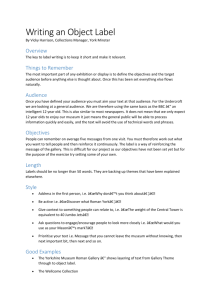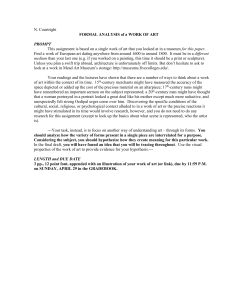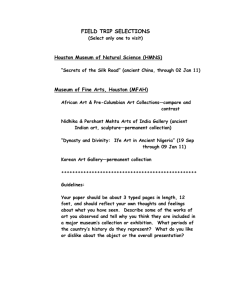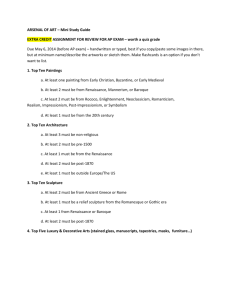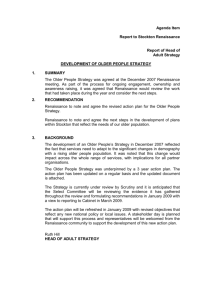chapter ten
advertisement
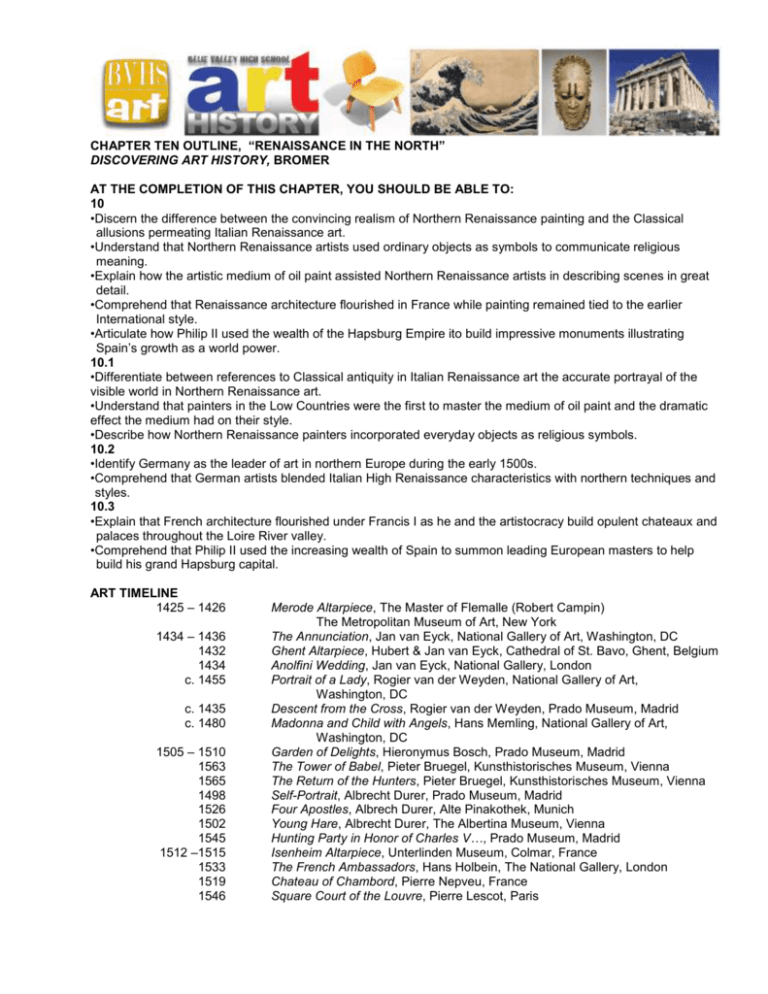
CHAPTER TEN OUTLINE, “RENAISSANCE IN THE NORTH” DISCOVERING ART HISTORY, BROMER AT THE COMPLETION OF THIS CHAPTER, YOU SHOULD BE ABLE TO: 10 •Discern the difference between the convincing realism of Northern Renaissance painting and the Classical allusions permeating Italian Renaissance art. •Understand that Northern Renaissance artists used ordinary objects as symbols to communicate religious meaning. •Explain how the artistic medium of oil paint assisted Northern Renaissance artists in describing scenes in great detail. •Comprehend that Renaissance architecture flourished in France while painting remained tied to the earlier International style. •Articulate how Philip II used the wealth of the Hapsburg Empire ito build impressive monuments illustrating Spain’s growth as a world power. 10.1 •Differentiate between references to Classical antiquity in Italian Renaissance art the accurate portrayal of the visible world in Northern Renaissance art. •Understand that painters in the Low Countries were the first to master the medium of oil paint and the dramatic effect the medium had on their style. •Describe how Northern Renaissance painters incorporated everyday objects as religious symbols. 10.2 •Identify Germany as the leader of art in northern Europe during the early 1500s. •Comprehend that German artists blended Italian High Renaissance characteristics with northern techniques and styles. 10.3 •Explain that French architecture flourished under Francis I as he and the artistocracy build opulent chateaux and palaces throughout the Loire River valley. •Comprehend that Philip II used the increasing wealth of Spain to summon leading European masters to help build his grand Hapsburg capital. ART TIMELINE 1425 – 1426 1434 – 1436 1432 1434 c. 1455 c. 1435 c. 1480 1505 – 1510 1563 1565 1498 1526 1502 1545 1512 –1515 1533 1519 1546 Merode Altarpiece, The Master of Flemalle (Robert Campin) The Metropolitan Museum of Art, New York The Annunciation, Jan van Eyck, National Gallery of Art, Washington, DC Ghent Altarpiece, Hubert & Jan van Eyck, Cathedral of St. Bavo, Ghent, Belgium Anolfini Wedding, Jan van Eyck, National Gallery, London Portrait of a Lady, Rogier van der Weyden, National Gallery of Art, Washington, DC Descent from the Cross, Rogier van der Weyden, Prado Museum, Madrid Madonna and Child with Angels, Hans Memling, National Gallery of Art, Washington, DC Garden of Delights, Hieronymus Bosch, Prado Museum, Madrid The Tower of Babel, Pieter Bruegel, Kunsthistorisches Museum, Vienna The Return of the Hunters, Pieter Bruegel, Kunsthistorisches Museum, Vienna Self-Portrait, Albrecht Durer, Prado Museum, Madrid Four Apostles, Albrech Durer, Alte Pinakothek, Munich Young Hare, Albrecht Durer, The Albertina Museum, Vienna Hunting Party in Honor of Charles V…, Prado Museum, Madrid Isenheim Altarpiece, Unterlinden Museum, Colmar, France The French Ambassadors, Hans Holbein, The National Gallery, London Chateau of Chambord, Pierre Nepveu, France Square Court of the Louvre, Pierre Lescot, Paris VOCABULARY 10.1 Realism Symbol 10.2 polyptych 10.3 chateau
